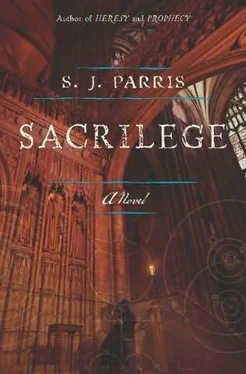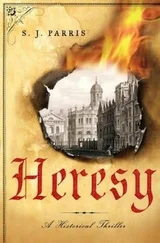“Find a bed where you will,” he slurred, pointing vaguely at the rest of us, then crashed into a chair and lurched towards the door, unlacing his breeches as he went. Two of the others heaved themselves unsteadily to their feet and stumbled after him. A crashing sound came from the corridor, as of someone falling into furniture. Only Bates was left, shuffling the cards and looking around the table at his fallen companions with disdain. He seemed worryingly alert. As his eyes came to rest on me, I quickly affected a cloudy gaze and swayed a little in my chair.
“Looks like we are the last men standing, Filippo,” he said, a slight slur in his voice. “God, what I wouldn’t give for a woman now. If only Nick had dismissed that old crone and got himself a young housemaid, we might have had some sport with her, eh?”
By way of answer, I let out a convincing belch.
“There is a bawdy house outside the West Gate might still let us in at this hour,” he said, hopefully. “Shall we try it, you and I?”
I waved a hand imprecisely, shaking my head. “I would be no use to a woman in this state,” I said, slumping forward across the table. “But you go.”
Bates regarded me for a moment, then sighed.
“No. It can wait.” He clicked his tongue impatiently and stretched out in his chair, his hands clasped behind his head. “God’s blood, I had just as well go drinking with my infant nieces for all the company these fellows have been tonight. We were supposed to keep on till dawn. You will take another cup, though, Filippo? Don’t leave me up drinking by myself here. I’ll wager you have some wild stories to tell from your travels.” He yawned and filled his tankard again and turned to me, the pitcher held out expectantly. The flush in his cheeks from the wine made him look even younger, and I saw that, for all his swagger, he was still just a boy, afraid of the silence, of being left alone. If I had not joined the Dominican order and given my twenties to philosophy and theology, might I have ended up in this kind of company? I was glad now that I never had the choice. Reluctantly I raised my cup for more.
Bates continued to drink steadily while I concealed my desperation for him to join the others in sleep, and instead recounted the tale of a young man in Naples who makes mischief by advising his lascivious elderly neighbour on the best way to seduce a beautiful courtesan, ensuring that the old man is caught out by his wife, while the young hero becomes the girl’s lover himself. Into the story I wove other characters: a miser, a conniving alchemist, and a pedantic schoolmaster, all bested by the wit of the young man, who I modestly implied was my younger self. Bates roared with laughter, poured himself more wine, and I watched in hope of seeing his eyelids droop as the story progressed. He had no idea, of course, that I was telling him the plot of The Candlemaker , a comedy I had written for the stage some years earlier; a ribald tale with a philosophical slant, filled with characters just like those I had observed when I first arrived in the glorious noisy, filthy, sexy chaos of the city of Naples as a youth. Bringing those streets to life made me feel how much I missed it.
It is rare that a storyteller feels delight at sending his audience to sleep, but I silently rejoiced when the wine and the late hour finally worked on Bates enough for him to stand up, sway a little on the spot, and then announce his intention of finding a place to bed down. I grunted, lay my head on my arms, and waited until the sound of his footsteps on the stairs and the boards overhead faded to silence.
My own head was more than a little fuzzy from the wine. I blinked hard to clear my vision, and when I was certain that no one was stirring, I took the two longest candles from the table and moved as noiselessly as I could towards the door, leaving my fellow gamblers snoring, spit falling in threads from their open mouths to pool on the boards beneath their sleeping heads.
I crossed the stone-flagged entrance hall and took the passageway past the stairs towards the back of the house, where I found a large, well-appointed kitchen, evidently cleaned and scrubbed scrupulously by the housekeeper before she retired for the night. I paused and looked around, the candles’ flames sending shadows skittering up the walls and across the black opaque panes of the casements. From somewhere in the distance came the drawn-out, wavering cry of an owl, a sound that never failed to make the hairs stand up on my neck, and I smiled in the dark thinking of the girl Rebecca and her belief that she had heard screaming coming from the burial ground. My fears that night were more prosaic; I did not want to be caught before I had a chance to uncover anything useful.
A cellar, I concluded, if it was used for storage, would most likely have some access from the kitchen. I moved carefully, anxious not to stumble into anything—pots, pans, brushes—that I might knock to the floor, announcing my presence. At the far side of the room, opposite the vast hearth with its rows of roasting spits, was a door set in a recess that appeared to open onto a rear courtyard. Beside it, an empty lantern hung on an iron hook, and with some relief I blew out one of my candles in case I had need later, and fitted the other carefully inside the glass, saving myself the trouble of shielding its flame with my hand. Immediately its light bloomed and seemed brighter, and I held it up as I tried the latch of the back door. This was firmly locked, but to the left was an archway that led through from the kitchen into a large pantry, its shelves stacked with jars and bottles, full sacks lying against the wall on the floor.
I lowered the lantern towards the floor and saw what I had hoped to find; a wooden hatch with an iron ring set into the flagstones. I set the lantern down on the floor and knelt beside it. Before I could reach out a hand to the ring, my breath was stopped in my throat by the sound of tapping from the room behind me. I swallowed silently, barely daring to turn, and it came again, sharp and insistent, a tap followed by a kind of scraping.
Slowly, I pulled my dagger from its sheath; keeping it low by my side but with my arm tensed and ready to spring, I rose and moved back into the kitchen, one step at a time, holding the lantern aloft. The room was empty. I waited, straining to listen, until eventually the tap came again, from outside the window: tap-tap, tap-tap, scrape. I felt my legs buckle with relief as I realised it was the branch of a tree, nudged by the wind; I laughed softly, and heard the trembling in my own laughter.
I worked quickly this time, determined not to be distracted again. To my surprise, the wooden hatch in the pantry opened smoothly, revealing a narrow flight of stone steps leading into a musty darkness below. Their treads were worn smooth with age and sagged in the middle from the passage of feet; I thought with pity of the elderly housekeeper being sent to fetch and carry up and down these precarious stairs. But perhaps she knew them so well by now she could find her way easily even in the dark. I was not so confident; keeping my feet within the yellow circle of the lantern’s glow, I descended carefully into a wide cellar, its ceiling supported in the centre by two thick stone pillars. Wooden barrels lined one wall, while another corner was filled with a jumble of what looked like broken furniture and a stack of crates, such as might be used to transport produce on a ship. I made a slow tour of the room with the light, examining objects, looking for traces of anything unusual on the floor or the walls, though already my heart was sinking with the weight of disappointment; I knew I was in the wrong place. The cellar had opened too easily to me; there was nothing hidden here but wine and refuse. The mysterious cellar Sophia had mentioned had to be elsewhere—yet where should I begin looking for it? It could not be more than a few hours until dawn, and I dare not be found wandering the house when the others awoke.
Читать дальше
Конец ознакомительного отрывка
Купить книгу
